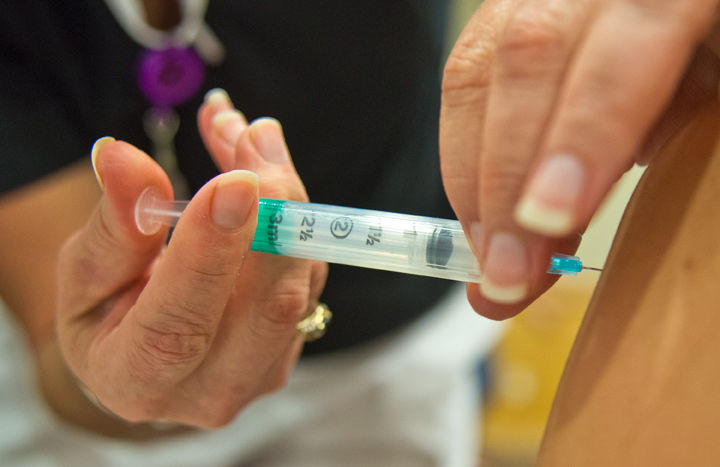student flu prevention at Health Center
Jodi Robertson, director of nurses for the Student Health Center, injects a flu vaccine Monday at the Student Health Center. “Usually an average of around 900 to1,000 vaccinations are administered for the year,” Robertson said. The next free flu clinic will be from 12:30 p.m. to 3:30 p.m. Oct. 17 at the Student Health Center
September 29, 2014
A pinprick may prevent missing a week of classes because of illness, and the university plans to make flu shots easier on students’ wallets.
The university administered free influenza vaccinations from 12:30 to 3:30 p.m. Monday in the Student Health Center Auditorium to encourage more inoculations and flu prevention awareness. The university plans to have another clinic Oct. 17.
Jodi Robertson, director of nurses at the Student Health Center, said the clinic administrators decided to dispense free flu shots when they discussed how to use the student health fee. She said the 1,200 vaccines they ordered this season will be given to students during clinics without charging the door fee.
Advertisement
“We want to do our part to get student awareness, to be able to get more interest in students getting vaccinated,” Robertson said.
She said it takes two weeks for the body to build an immune response to the virus.
Dr. Erica Kaufman, a physician and infectious disease expert with Southern Illinois Healthcare, said the body must have a reaction to the inoculation before it can build an immune response. She said this reaction feels like a slight sickness, which includes body aches.
Kaufman said it’s better to build the immune response as soon as vaccines are available. If the body has to build immunity after contracting the disease it has time to incubate, Kaufman said.
“It’s just going to keep replicating and replicating and doing damage while your immune system is behind the 8-ball,” Kaufman said.
She said it is not uncommon for someone between the ages of 18 and 30 to die because of the flu.
“It’s not something that you only read about in books, but it does occur often enough for us to have it on our radar,” Kaufman said.
Advertisement*
Robertson stated in an email the health center does not expect to run out of the vaccine, but because of cost, it has no plan to order a second batch. She said the health center will post on its website when the vaccinations run out and will refer students to other available inoculation locations.
Robertson said people with weakened immune systems or allergies to the vaccine are better protected from the virus when other people get inoculated because of a phenomenon called herd immunity.
Kaufman said herd immunity is the principle that the more people have immunity to a communicable disease, the less likely it is someone will come in contact with the disease.
“That’s the notion of public health,” she said. “Yes, we are taking care of ourselves, but we’re also taking care of each other.”
Robertson said this year’s vaccine is a standard trivalent vaccine, meaning it immunizes patients for three strains of influenza. The vaccine prevents strains of H1N1, H3N2 and B strains. The Centers for Disease Control and Prevention states on its website those strains are categorized by the kinds of proteins they have.
Flu seasons are unpredictable, but the CDC gathers information from previous seasons and adjusts vaccines accordingly for the upcoming year, according to its website.
Robertson said the Student Health Center is a sentinel site for the CDC, meaning it gathers data from flu testing and sends it to the CDC so it can identify flu strains and adjust the next year’s vaccines. She said the university has not had an epidemic level of outbreak since 2009, when the swine flu spread.
During the 2012-2013 flu season the Student Health Center documented 66 cases of influenza out of 22,809 visits to the medical clinic. For 2013-2014, the clinic documented 80 cases out of 21,243 visits, Robertson stated in an email.
“When there’s outbreaks in the community, we see the same on campus,” Robertson said.
She said the vaccine is not a live virus and is available to those with weakened immune systems. She also said the vaccine uses eggs as its medium and is not recommended for those with severe allergies to eggs.
Robertson said the Student Health Center has procedures in place in case of an influenza outbreak, which includes reducing spread of the virus within the clinic by handing out surgical masks and hand sanitizer.
Advertisement









